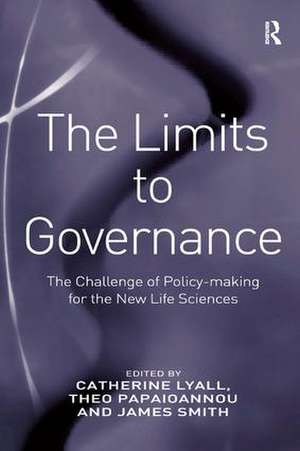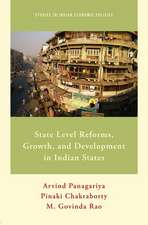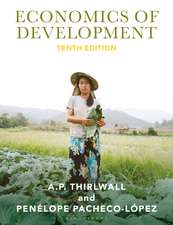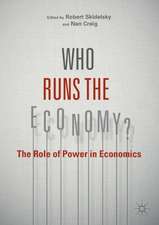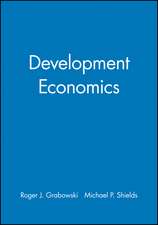The Limits to Governance: The Challenge of Policy-Making for the New Life Sciences
Autor Theo Papaioannou Editat de Catherine Lyallen Limba Engleză Hardback – 28 iun 2009
| Toate formatele și edițiile | Preț | Express |
|---|---|---|
| Paperback (1) | 455.78 lei 6-8 săpt. | |
| Taylor & Francis – 16 noi 2016 | 455.78 lei 6-8 săpt. | |
| Hardback (1) | 1054.71 lei 6-8 săpt. | |
| Taylor & Francis – 28 iun 2009 | 1054.71 lei 6-8 săpt. |
Preț: 1054.71 lei
Preț vechi: 1286.24 lei
-18% Nou
Puncte Express: 1582
Preț estimativ în valută:
201.82€ • 210.30$ • 167.11£
201.82€ • 210.30$ • 167.11£
Carte tipărită la comandă
Livrare economică 03-17 aprilie
Preluare comenzi: 021 569.72.76
Specificații
ISBN-13: 9780754675082
ISBN-10: 0754675084
Pagini: 300
Dimensiuni: 156 x 234 x 18 mm
Greutate: 0.45 kg
Ediția:1
Editura: Taylor & Francis
Colecția Routledge
Locul publicării:Oxford, United Kingdom
ISBN-10: 0754675084
Pagini: 300
Dimensiuni: 156 x 234 x 18 mm
Greutate: 0.45 kg
Ediția:1
Editura: Taylor & Francis
Colecția Routledge
Locul publicării:Oxford, United Kingdom
Cuprins
Contents: Foreword; Preface; The challenge of policy-making for the new life sciences, Catherine Lyall, Theo Papaioannou and James Smith; Part 1 Principles: Governance and justice: the challenge of genomics, Theo Papaioannu; The roles of values and interests in the governance of the life sciences: learning lessons from the 'ethics+' approach of UK Biobank, Graeme Laurie, Ann Bruce and Catherine Lyall; Governing reproductive treatment and research: from the moral to the political to the legal - and back again? Or ’there and back again, a regulator’s (Hobbit’s) odyssey (holiday)’, Shawn H.E. Harmon. Part 2 Processes: Evolution along the government-governance continuum: impacts of regulations on medicines innovation in the United States, Christopher-Paul Milne and Joyce Tait; Governments and governance of bioscience as a 'new security challenge', Paul Nightingale and CaitrÃona McLeish; Biosciences, 'development' and the abstraction of governance, James Smith; Ever-changing policy context: the one stable threat to biotech governance in Africa?, Julius Tazvishaya Mugwagwa. Part 3 People: Advocacy groups as research organizations: novel approaches in research governance, Nadja Kanellopoulou; Non-governmental limits: governing biotechnology from Europe to Africa, Matthew Harsh; Deliberative governance: political fad or a vision of empowerment?, Peter Bryant; Governance in action in the life sciences: some lessons for policy, Catherine Lyall, Theo Papaioannou and James Smith; Index.
Notă biografică
Dr Catherine Lyall is Deputy Director of the ESRC Innogen Centre at the University of Edinburgh. Dr Theo Papaioannou is Lecturer in Innovation and the Politics of Development at the Open University and a member of the ESRC Centre for Social and Economic Research on Innovation in Genomics (INNOGEN). He is also a Visiting Research Fellow at the University of Brighton and a Sessional Lecturer at the University of London. Dr James Smith is a Co-Director and Senior Lecturer in the Centre of African Studies and Director of Developing Country Research in the ESRC Innogen Centre, University of Edinburgh. He is a Co-Director of the Edinburgh International Development Centre and a visiting research fellow in Development Policy and Practice at the Open University.
Recenzii
'This is a much-needed, constructively critical look at governance as the proposed alternative to top-down government approaches. It is generally relevant, not just for the new life sciences which are the occasion for this volume. Enjoy the variety of the chapters, and in particular the sustained attention to what is happening in African countries.' Arie Rip, University of Twente, The Netherlands 'In contemporary science policy debate much store is set in developing better governance in response to the growing complexity and uncertainty of innovative science. This is especially true of the life sciences, and this book, expertly edited by Catherine Lyall and her colleagues, provides a fresh and critical examination of the the tools of governance that are and should be applied within the life sciences industries: the tension between industrial, government and the wider public interest requires careful analysis and a deft handling of the legal, regulatory and broader participative processes involved. This book is a timely, highly informed and critical examination of the contemporary governance debate and recommended to those working in science studies, public policy and political science.' Andrew Webster, York University, UK 'Each chapter is well-researched and of outstanding quality... rich with insights, presents difficult material in a compact and readable manner, and develops a cogent argument... The Limits to Governance strikes a nice balance between diversity and coherence, which is a rare feat for an edited volume. Each chapter adopts unique perspectives on novel case studies, but each also contributes to the unifying ''limits to governance'' thesis. A final strength that may at first appear to be a weakness of the volume is its normative non-commitment. The central question is: what are ''successful'' or ''good'' policies for the new life sciences? There is no definitive answer to be found. Rather, the question is left open, which allows each author to define the goals in his or her own way, which in turn allows the reader to assess multiple answers.' Contemporary Sociology
Descriere
How can policy-makers ensure that we benefit from the health developments brought by genomics while satisfying both the expectations of society and the economic imperatives? This book offers a critique of the new governance agenda for science and innovation in the context of the life sciences, and particularly genomics. The authors argue that the governance of genomics presents policy-makers worldwide with a variety of new problems - their valuable research here offers the solutions.
